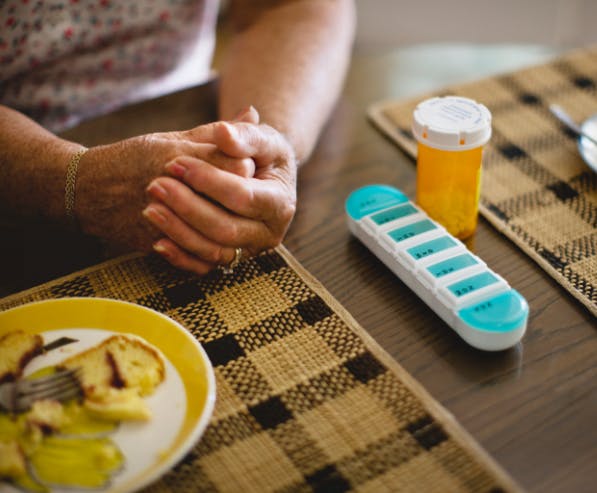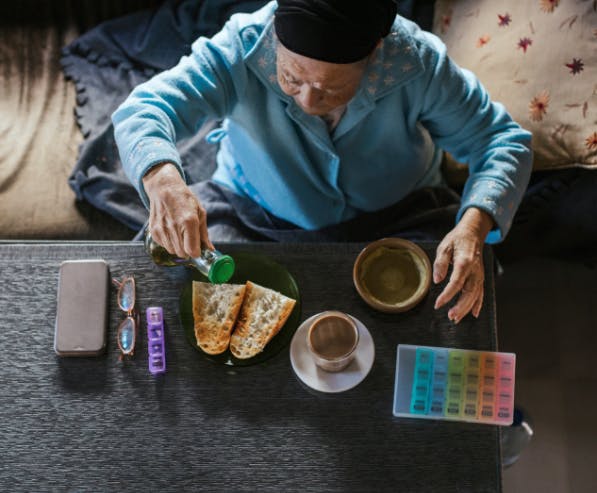What are drug interactions?
Did you know that certain medications, foods and drinks can change the way your medicine works? When this happens, it’s known as a drug interaction. Most are not serious, but some can have life-threatening effects, which is why it’s so important to check drug interactions before you begin taking over the counter or prescription medicines.
Drug interactions can occur between medications and certain foods or beverages, and even vitamins and supplements. They can have toxic effects on your body, make your medical condition worse or even affect the way your medication works, resulting in undesired side effects.
What drug interactions should you be aware of?
When it comes to combining painkillers or taking them with other medication, there are some common risks to look out for.
There are three main types of drug interaction1 to keep in mind:
1. Drug-drug interactions: As you might guess from the name, this is the case of mixing one drug with another. A common example can be mixing paracetamol with another pain-relief medication like co-codamol, which also contains paracetamol. Mixing these two medicines can result in an overdose.
2. Drug-food/beverage interactions: As you are unlikely to go more than a few hours without drinking or eating, it’s also a must to know the drug compatibility with food or drinks such as grapefruit juice which can affect how medication is metabolized.
3. Drug-condition interactions: This type of drug interaction occurs when a medical condition that you may have, like high blood pressure or diabetes, causes harm by interacting with your medication.2 For example, some decongestants can exacerbate high blood pressure and if you have type 2 diabetes, research shows there are many drug condition interactions to watch out for,3 so always discuss this possibility with your doctor before taking new medication.
What are some drug interactions with common painkillers
Before taking more than one painkiller you should talk to your healthcare provider and read the product information – to make sure you are aware of any possible risks.
Paracetamol4 – also known as acetaminophen, is an over the counter drug to relieve pain and reduce fever, best used for the treatment of mild to moderate pains like headaches, colds, flu symptoms, toothache or muscle pain. Do not take it with other medicines that also contain paracetamol. Paracetamol is contained in many medicines to treat pain, fever, symptoms of cold and flu, and sleep medicines. If you have liver or kidney disease, talk to your doctor before taking paracetamol. Do not take more than the recommended dose, as this may be harmful, including serious harm to your liver.
Paracetamol can interact with warfarin5 when used frequently. Therefore, it is important to talk to your doctor if you are taking warfarin or similar medicines used to thin the blood to help avoid the potential risk of bleeding.
If you are taking the combination of paracetamol with caffeine you should avoid the use of lithium. Caffeine can affect the way your body eliminates lithium causing too much to build up in your body, resulting in adverse effects.
Certain conditions might also affect the way paracetamol works in your body. For example, if you have liver or kidney impairment or are underweight or malnourished you should talk to your doctor before using paracetamol.
Finally, if you drink alcohol regularly you should talk to your doctor before taking paracetamol.
NSAIDs6 – Non-Steroidal-Anti-Inflammatory-Drugs such as ibuprofen, diclofenac, and aspirin are over the counter drugs that can help reduce inflammation as well as ease pain, so are best used for treating conditions that cause inflammation – such as injuries, arthritis or period pain. They can also help reduce fever.
In general, NSAIDs should not be combined with each other. Inform your doctor or pharmacist if you have recently taken or are regularly taking prescription or over the counter products including other anti-inflammatory medicines or painkillers such as ibuprofen and aspirin.7
Other drugs that might interact with NSAIDs include corticosteroids, methotrexate, ciclosporin, tacrolimis, lithium, selective serotonin-reuptake inhibitors (SSRIs), diuretics, ACE inhibitors, trimethoprim, blood thinners, and medication for seizures or diabetes.8
It is important to tell your doctor or pharmacist if you are taking or have recently taken any other medicines, including medicines obtained without a prescription before using an NSAID.
Topical painkillers - diclofenac gel or patches are applied to the skin. Less medicine is absorbed into the bloodstream as compared to an oral form of diclofenac, but you should still tell your doctor or pharmacist before use if you are taking, or have recently taken, any prescription or over the counter products. There is also the chance of a drug interaction when applying cosmetics or sunscreen to the same area. The same applies to insect repellent and lotions.To avoid side effects, don’t apply any medicated skin products on the same area you treat with diclofenac topicals.9
Think you’ve combined the wrong painkillers? Ring emergency services and seek medical advice immediately.
Painkillers for older people
As you get older, you may find you’re required to take several medications at the same time, known medically as polypharmacy. The use of multiple concomitant medications is generally referred to as 5 or more medications per day.10 Recent estimates show that nearly two million people in the UK over the age of 65 are taking at least seven prescribed medicines.11 Potential for drug-drug interactions increases with the use of multiple drugs.12
As you age, you are more likely to suffer from arthritis, bone and joint disorders.13 You can use a product such as paracetamol or diclofenac to relieve the pain, but check with your healthcare provider about possible drug interactions and ensure you read all of the product information.

Can I take painkillers during pregnancy?
If you’re pregnant, it is recommended to take the lowest dose of paracetamol for the shortest amount of time possible.14 It is always best to talk to your healthcare professional before taking paracetamol if you are pregnant.
If you’re thinking of taking NSAIDs such as ibuprofen, diclofenac or aspirin and you’re pregnant, think you might be pregnant, or planning to have a baby, always ask your doctor first. Do not take NSAIDs if you are in the last 3 months of pregnancy, as it could harm your unborn child.15
Is it safe to use painkillers while getting vaccinated?
After any vaccination, you may experience localised pain in the days following, and other symptoms, such as headache and fever. If you’re getting a vaccine for flu or Covid-19, you can take paracetamol for any discomfort after your jab if needed.16
Medical experts don’t recommend taking paracetamol or ibuprofen as a preventative measure to avoid potential symptoms of pain and fever ahead of receiving a COVID-19 vaccination. If in doubt, consult your doctor.
Why combine paracetamol and caffeine?
When combined with paracetamol, caffeine acts to amplify the pain-relieving effects of paracetamol.17
If you’re taking medicine with this combined formula you should be aware of your overall caffeine consumption, such as drinking tea or coffee. Drinking too many lattes along with taking paracetamol and caffeine can affect your sleeping pattern, cause insomnia, shaking and palpitations.
You should also consult your doctor before taking this combination if you have kidney or liver problems, are underweight or malnourished or regularly drink alcohol.

Painkillers and alcohol
In addition to drug-drug interactions it is important to be aware of the effects of taking painkillers with beverages such as alcohol. If you regularly drink alcohol you should talk to your doctor before taking painkillers. Paracetamol and alcohol are processed by the liver, so combining the two in large quantities will put an extra strain on your body that should be avoided.18 Additionally, taking large amounts of NSAIDs and alcohol can increase the risk of bleeding in your stomach. 19
Before taking any painkillers or medication, a chat with your doctor is the right place to start. This guide will also help you know How to Treat It Right and use medication safely. Whatever’s on your mind, we can put it right.
SHARE THIS ARTICLE
1 Drug Interaction Checker, Drugs, https://www.drugs.com/drug_interactions.html accessed 14.06.21
2 https://www.fda.gov/drugs/resources-you-drugs/drug-interactions-what-you-should-know accessed 18.08.21
3 Drug Disease and Drug Interactions, BMJ, https://www.bmj.com/content/350/bmj.h949 accessed 14.06.21
4 Paracetamol For Adults, NHS, www.nhs.uk/medicines/paracetamol-for-adults accessed 14.06.21
5 Paracetamol, GDS – P29
6 NSAIDs, NHS, www.nhs.uk/conditions/nsaids accessed 14.06.21
7 Oral Diclofenac, GDS – P24
8 Oral Diclofenac GDS – P24
9 Side effects, Voltaren Gel, https://www.rxlist.com/voltaren-gel-drug/patient-images-side-effects.htm accessed 18.08.21
10 Polypharmacy: A Global Risk Factor for Elderly People, NCBI, https://www.ncbi.nlm.nih.gov/pmc/articles/PMC4295469/ accessed 17.08.21
11 A More Considered Approach to Prescribing Medicines to Older People, Age UK, https://www.ageuk.org.uk/latest-press/articles/2019/august/age-uk-calls-for-a-more-considered-approach-to-prescribing-medicines-for-older-people/ accessed 14.06.21
12 Polypharmacy: A Global Risk Factor for Elderly People, NCBI, https://www.ncbi.nlm.nih.gov/pmc/articles/PMC4295469/ accessed 17.08.21
13 The Risk of Drug-Drug Interactions with Paracetamol in a Population of Hospitalized Geriatric Patients, NCBI, https://www.ncbi.nlm.nih.gov/pmc/articles/PMC6995317/ accessed 18.08.21
14 Paracetamol for Adults, NHS, https://www.nhs.uk/medicines/paracetamol-for-adults/ accessed 14.06.21
15 Ibuprofen, GDS – P20
16 What to Expect after Covid-19 Vaccination, Gov.uk, https://www.gov.uk/government/publications/covid-19-vaccination-what-to-expect-after-vaccination/what-to-expect-after-your-covid-19-vaccination accessed 14.06.21.
17 Paracetamol and Caffeine GDS – P15
18 Paracetamol and Alcohol, MedsNews, https://www.medsnews.com/health/is-it-dangerous-to-use-paracetamol-and-alcohol/ accessed 18.06.21
19 Can I Drink Alcohol if I am Taking Painkillers, NHS, https://www.nhs.uk/common-health-questions/medicines/can-i-drink-alcohol-if-i-am-taking-painkillers/ accessed 14.06.21

Let's treat it right and Panadol
Find out more, including usage and dosage guidance for pain relief treatments, from Panadol.

Let's treat it right and Voltaren
Find out more about the right use of pain relief medicines, including dosing and disposal advice, from Voltaren.




